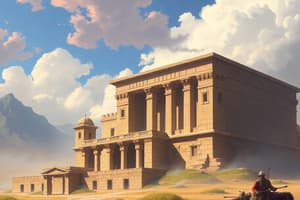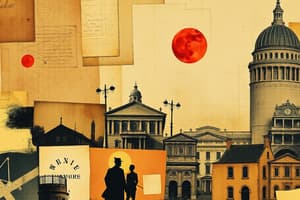Podcast
Questions and Answers
What does the word "history" involve studying?
What does the word "history" involve studying?
The word "history" involves studying the causes, triggers, and progression of changes within human societies including political, economic, social, and cultural events.
What does the "history" field focus on understanding?
What does the "history" field focus on understanding?
The field of history focuses on understanding the development of political, economic, social, and cultural events within human civilizations.
What is the critical engagement of "history" with?
What is the critical engagement of "history" with?
The critical engagement of "history" is with the present, and how it influences our perception of the past.
The text suggests that our personal perspective has no impact on how we construct history.
The text suggests that our personal perspective has no impact on how we construct history.
Which of the following are types of historical sources mentioned in the text? (Select all that apply)
Which of the following are types of historical sources mentioned in the text? (Select all that apply)
What is the main concern regarding information from historical sources?
What is the main concern regarding information from historical sources?
What is the purpose of scientific methods in analyzing historical sources?
What is the purpose of scientific methods in analyzing historical sources?
Historical sources always offer perfect, unbiased information about the past.
Historical sources always offer perfect, unbiased information about the past.
What is the main purpose of interpreting historical sources?
What is the main purpose of interpreting historical sources?
The text suggests that the "Otzi" iceman was discovered in the Swiss Alps.
The text suggests that the "Otzi" iceman was discovered in the Swiss Alps.
Mit welcher wissenschaftlichen Disziplin beschäftigt sich der Text?
Mit welcher wissenschaftlichen Disziplin beschäftigt sich der Text?
Was befasst sich die Wissenschaft ‚Geschichte‘ laut Text?
Was befasst sich die Wissenschaft ‚Geschichte‘ laut Text?
Welche dieser Optionen sind Beispiele für historische Quellen?
Welche dieser Optionen sind Beispiele für historische Quellen?
Alle historischen Quellen liefern immer zuverlässige Informationen über die Vergangenheit.
Alle historischen Quellen liefern immer zuverlässige Informationen über die Vergangenheit.
Womit formen unsere persönlichen Sichtweisen laut Text die Konstruktion des historischen Wissens?
Womit formen unsere persönlichen Sichtweisen laut Text die Konstruktion des historischen Wissens?
Flashcards
History as a field of study
History as a field of study
Investigates the development and consequences of societal changes throughout time.
Historical Sources
Historical Sources
Evidence from the past, like documents or artifacts.
Primary Sources
Primary Sources
Direct evidence from the past (e.g., letters, artifacts).
Historical Context
Historical Context
Signup and view all the flashcards
Oral Sources
Oral Sources
Signup and view all the flashcards
Written Sources
Written Sources
Signup and view all the flashcards
Visual Sources
Visual Sources
Signup and view all the flashcards
Material Sources
Material Sources
Signup and view all the flashcards
Mobile Sources
Mobile Sources
Signup and view all the flashcards
Immobile Sources
Immobile Sources
Signup and view all the flashcards
Historical Interpretation
Historical Interpretation
Signup and view all the flashcards
Subjective
Subjective
Signup and view all the flashcards
Historical Methodology
Historical Methodology
Signup and view all the flashcards
Synthesis of Information
Synthesis of Information
Signup and view all the flashcards
Limited Data
Limited Data
Signup and view all the flashcards
Social Studies
Social Studies
Signup and view all the flashcards
Political education
Political education
Signup and view all the flashcards
Historical Knowledge
Historical Knowledge
Signup and view all the flashcards
Contemporary Society
Contemporary Society
Signup and view all the flashcards
Political Events
Political Events
Signup and view all the flashcards
Economic Events
Economic Events
Signup and view all the flashcards
Cultural Events
Cultural Events
Signup and view all the flashcards
Social Trends
Social Trends
Signup and view all the flashcards
Political Trends
Political Trends
Signup and view all the flashcards
Historical Replication
Historical Replication
Signup and view all the flashcards
Was ist Geschichte?
Was ist Geschichte?
Signup and view all the flashcards
Was sind historische Quellen?
Was sind historische Quellen?
Signup and view all the flashcards
Was sind primäre Quellen?
Was sind primäre Quellen?
Signup and view all the flashcards
Was sind Sekundärquellen?
Was sind Sekundärquellen?
Signup and view all the flashcards
Was sind mündliche Quellen?
Was sind mündliche Quellen?
Signup and view all the flashcards
Was sind schriftliche Quellen?
Was sind schriftliche Quellen?
Signup and view all the flashcards
Was sind visuelle Quellen?
Was sind visuelle Quellen?
Signup and view all the flashcards
Was sind materielle Quellen?
Was sind materielle Quellen?
Signup and view all the flashcards
Was sind mobile Quellen?
Was sind mobile Quellen?
Signup and view all the flashcards
Was sind immobile Quellen?
Was sind immobile Quellen?
Signup and view all the flashcards
Was ist historische Kontextualisierung?
Was ist historische Kontextualisierung?
Signup and view all the flashcards
Was ist historische Interpretation?
Was ist historische Interpretation?
Signup and view all the flashcards
Was ist Subjektivität?
Was ist Subjektivität?
Signup and view all the flashcards
Was ist historische Methodik?
Was ist historische Methodik?
Signup and view all the flashcards
Was ist eine Synthese von Informationen?
Was ist eine Synthese von Informationen?
Signup and view all the flashcards
Was ist die Bedeutung von begrenztem Datenmaterial?
Was ist die Bedeutung von begrenztem Datenmaterial?
Signup and view all the flashcards
Was ist der Unterschied zwischen der Vergangenheit und der Geschichte?
Was ist der Unterschied zwischen der Vergangenheit und der Geschichte?
Signup and view all the flashcards
Wie beeinflusst die Vergangenheit die Gegenwart?
Wie beeinflusst die Vergangenheit die Gegenwart?
Signup and view all the flashcards
Warum ist es wichtig, die Vergangenheit zu verstehen?
Warum ist es wichtig, die Vergangenheit zu verstehen?
Signup and view all the flashcards
Was ist der Unterschied zwischen Geschichte und Geschichtswissenschaft?
Was ist der Unterschied zwischen Geschichte und Geschichtswissenschaft?
Signup and view all the flashcards
Welche Arten von Ereignissen untersucht die Geschichte?
Welche Arten von Ereignissen untersucht die Geschichte?
Signup and view all the flashcards
Was sind soziale Studien?
Was sind soziale Studien?
Signup and view all the flashcards
Was ist politische Bildung?
Was ist politische Bildung?
Signup and view all the flashcards
Was ist das Ziel der Geschichtswissenschaft?
Was ist das Ziel der Geschichtswissenschaft?
Signup and view all the flashcards
Welche Herausforderungen gibt es bei der Interpretation von historischen Quellen?
Welche Herausforderungen gibt es bei der Interpretation von historischen Quellen?
Signup and view all the flashcards
Study Notes
What is History?
- History, as a discipline, examines the causes, triggers, processes, and impacts of societal changes.
- It investigates political, economic, social, and cultural events throughout human history.
- The term "historical" refers to something related to or occurring in the past.
- Historical analysis is influenced by the historian's personal perspective and limited knowledge.
Historical Sources
- Historical research relies on various source types, including oral, written, visual, and material evidence.
- Oral accounts, such as interviews and personal stories, offer subjective perspectives.
- Written documents, such as letters, diaries, or official records, offer details.
- Visual materials like paintings, photographs, and maps provide images and details about the past.
- Material sources, including tools, artifacts, and structures, offer a tangible connection to the past.
- Historical sources should be critically examined. Sources contain information from the past, but may also contain errors, omissions, or biased perspectives.
- Historians analyze and interpret these sources following specific guidelines and methods.
Studying That Suits You
Use AI to generate personalized quizzes and flashcards to suit your learning preferences.




